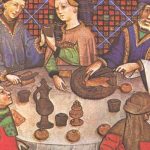 International Conference on Food Economies in Pre-Modern Europe (Web)
International Conference on Food Economies in Pre-Modern Europe (Web)
Organisers: Pere Benito i Monclús, Frederic Aparisi Romero, Maria López Carrera, Adrià Mas Craviotto and Guillem Roca Cabau (Univ. de Lleida), and Joan Maltas i Montoro (Univ. de Paris 8 Vincennes – Saint-Denis)
New Date: 17.–18.09.2020
Venue: University of Lleida, Spain
Proposals by: extended – 31.05.2020
During the first half of the 20th century, the market was interpreted as an exogenous element to the medieval society, which was considered fundamentally autarkic. Under the influence of the market, medieval society increasingly focused its productive bases on commercialization, whose growth was the primum movens of geographical specialization. Under these premises, a good deal of the historiography of the time maintained that between the twelfth and eighteenth centuries, there was a progressive and more or less linear trend of the European economy towards commercialization; feudal institutions were an obstacle for this development, and commercialization emerged from the cities and was introduced into the countryside to transform rural economy.
In the last two decades, a number of studies have reconsidered the role of market economy and commercialization among pre-modern peasant societies and have shown that between the twelfth and fourteenth centuries both had already penetrated strongly in rural areas. Another line of studies, focusing on the importance of interregional exchanges, states that the development and integration of markets did not occur in a linear fashion, and wonders whether the reasons that determined it were more linked to technological or institutional factors.
Within these new lines of research, food markets take a fundamental place. The food that has received the most attention is cereal. The importance of the commercial networks through which it circulated has been determined, as well as the importance of the cereal in determining the conditions of life in the countryside and the city or the relevance of the policies that tried to control or tax its traffic. The relationship between market and dearth or famine remains one of the most controversial issues to date. In the 18th century, … read more (Web).
